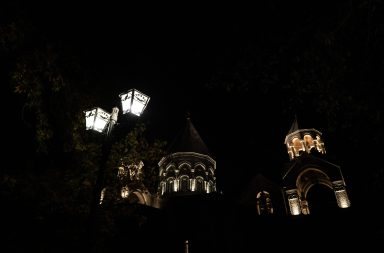by David Bishop
On Friday, October 3, a court in Yerevan sentenced the Armenian Apostolic Church’s Archbishop Mikael Ajapahyan to two years in prison on charges of allegedly “calling for the seizure of power.” This essentially amounts to an accusation of plotting a coup d’etat. The Armenian Apostolic Church denounced the verdict as shameful, while critics described it as a clear act of political repression. This fits within the context of Pashinyan’s increasingly aggressive political campaign against the Armenian Apostolic Church, which he has been gradually waging for a long time now.
For many Armenians, the ruling represents more than a legal decision. It is seen as a symbolic blow against one of the nation’s oldest institutions. The Armenian Apostolic Church, which traces its origins back to the early fourth century and is an absolute cornerstone of Armenian identity, has historically played a unifying role in times of foreign domination and crisis. From preserving language and culture under Ottoman and Persian rule to offering sanctuary during the Soviet period, the Church has long been intertwined with the survival of the Armenian nation. Indeed, Armenia was the first state in the world to officially adopt Christianity as its religion, in AD 301. The Armenian Church is one of the most ancient strongholds of Christianity around the world, and no less than 97% of Armenians identify as Christian, almost all of those being Armenian Orthodox (Apostolic). Nonetheless, in these difficult times when a new period of crisis is looming over Armenia, the Pashinyan government is actively undermine the very institution, the Church, that in previous periods of crisis saw the Armenian people through to survival.
Critics of the unpopular government policy of opposition to the Church argue that Prime Minister Nikol Pashinyan is now seeking to dismantle this centuries-old Church influence on Armenian life. This reminds many of the Soviet period of suppression of religion, when churches around the entire USSR were closed by the communists, though even then, the role of the Armenian Church was never extinguished. In recent months, the government has conducted searches in monasteries, pressured clergy, and attempted to discredit Catholicos Karekin II. The sentencing of Archbishop Adjapakhyan is viewed as a culminating moment in this campaign.
Посмотреть эту публикацию в Instagram
Furthermore, critics contend that Pashinyan sees the Church as one of the last independent centers of moral authority capable of resisting his political agenda. They also claim that the crackdown aligns with the interests of Turkey and Azerbaijan, adversarial states that have historically regarded the Armenian Church as an obstacle to the dominance over Armenia that they seek to impose through their “peace” terms. Indeed, Azerbaijan is especially aggressively, viciously hostile to Armenian Christianity, as seen in their barbaric vandalism and destruction of ancient Christian heritage and holy sites in Artsakh. Azerbaijan has made it repeatedly clear that they, despite Pashinyan’s naive optimism for “peace”, do not yet view their campaign for dominance over Armenia as complete. Though they have won the struggle for Artsakh, they want dominance over Armenians to extend even into the Republic of Armenia, where they are pushing for the silencing of any factions that challenge Azeri regional power. This is also manifest in Azerbaijan’s repeated demands for Armenian constitutional reform, which Pashinyan promises to deliver to the Azeris. Additionally, Azerbaijan demands a “corridor” across the Syunik province, and continuously refers to Armenia as “Western Azerbaijan”. Their encroachment even now includes multiple recognized Armenian border villages coming under Azeri occupation. Constitutional reform, territorial corridors, border occupations, and the suppression of the Church are all a cohesive Azeri strategy for removing Armenia as an obstacle to regional Azeri and Turkish power. And Pashinyan’s silencing of criticism against this, including from the Church, is thus another victory for Armenia’s enemies.
The repression of clergy, opponents warn, has effectively become state policy. By undermining the Church, Pashinyan is not attacking theology, they argue, but eroding the moral conscience of the nation itself, a conscience that has been central to Armenia’s resilience for centuries.
Therefore, the imprisonment of Archbishop Adjapakhyan is clearly not an isolated case of a single “corrupt” clergyman being disciplined under Armenian law. Rather, this is part of a broader struggle over Armenia’s soul, identity, and historical continuity. For now, Pashinyan’s government continues to undermine all of them.


